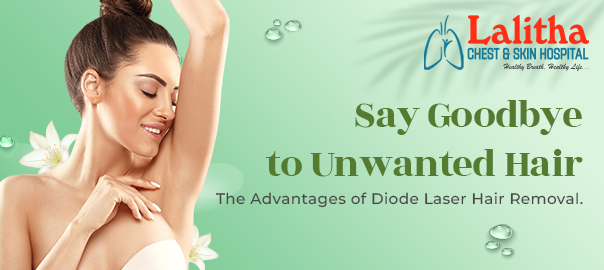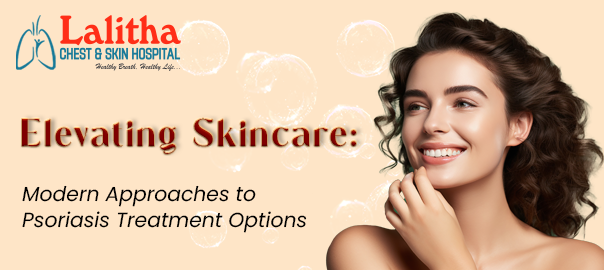Unwanted hair can be a recurring issue. Conventional methods such as shaving, waxing, and using depilatory creams provide only short-term results, making it a frustrating problem in need of a lasting solution.
Diode laser hair removal has emerged as a popular choice, especially for those seeking a more permanent and effective solution. Unlike other hair removal techniques, this method provides long-lasting results and minimal discomfort and is suitable for various skin types.
If you’re considering hair removal treatments, it’s always advisable to consult a dermatologist with a proven track record in advanced procedures. However, before your consultation, it helps to understand how these procedures work and their nuances. This blog gathers insights from renowned famous skin specialist Dr. B. Jyothi in Karimnagar to provide a comprehensive guide on the diode laser hair removal system. This will help you understand the topic in depth. Read on:
1. Effective for All Skin Types:
One of the significant advantages of diode laser hair removal is its ability to treat all skin types. Earlier laser treatments, like the ruby or alexandrite lasers, worked best on fair-skinned individuals with dark hair. However, the diode laser has a longer wavelength, allowing it to penetrate deeper into the skin and target the hair follicles without affecting the surrounding skin. This makes it suitable for individuals with both lighter and darker skin tones.
2. Precision and Efficiency:
The diode laser targets the melanin (pigment) in the hair follicle with incredible precision, ensuring that only the hair follicles are damaged, leaving the surrounding skin unaffected. This precision reduces the risk of burns or skin irritation, sometimes occurring with other laser types. Furthermore, diode lasers can cover larger areas quickly, making treatments more efficient and reducing session times.
3. Long-Term Results:
Unlike temporary methods such as shaving or waxing, diode laser hair removal provides long-term benefits. After completing a few sessions, many individuals notice a significant decrease in hair growth. While results may differ from person to person, most patients enjoy smooth, hair-free skin for extended periods, often lasting months or even years. Any regrowth over time is typically finer, lighter, and much less dense.
- Minimal Discomfort:
While no hair removal method is pain-free, diode laser treatments are generally more comfortable than other laser technologies. Many diode lasers come equipped with cooling mechanisms that soothe the skin during treatment, reducing discomfort and making the procedure more tolerable for patients. Most people describe the sensation as a mild tingling or snapping of a rubber band against the skin.
- Safe and FDA-Approved:
Diode laser hair removal has undergone extensive clinical testing and is FDA-approved for permanent hair reduction. When performed by a trained and licensed professional, it is a safe and effective method for eliminating unwanted hair. Additionally, since the laser is non-invasive, there is minimal downtime, and patients can resume normal activities shortly after treatment.
- Cost-Effective in the Long Run:
While the upfront cost of diode laser hair removal may seem higher than traditional methods, it is a cost-effective investment over time. When you consider the lifetime expenses of razors, shaving creams, waxing appointments, and other hair removal products, the savings from laser hair removal become evident. The reduced frequency of treatments and long-lasting results make it a worthwhile choice for those looking to save time and money.
- Lower Risk of Ingrown Hairs:
Ingrown hairs are frequently associated with shaving and waxing, often leading to irritation, redness, and infection. Diode laser hair removal minimizes the risk of ingrown hairs by targeting the hair follicle directly. As hair growth decreases, the chances of experiencing painful ingrown hairs are significantly reduced, resulting in smoother, less irritated skin.
- Customizable Treatment Plans:
Another benefit of diode laser hair removal is the ability to customize the treatment plan based on the individual’s unique needs. Different settings can be adjusted to accommodate the patient’s skin, hair, and treated area. This flexibility ensures you receive the most effective treatment possible for your concerns.
Diode laser hair removal offers a range of advantages that make it an excellent option for those looking to say goodbye to unwanted hair. With its precision, safety, minimal discomfort, and long-lasting results, it’s no wonder that diode laser technology has become a go-to choice for people seeking permanent hair reduction. Whether you’re tired of constant shaving, battling ingrown hairs, or simply want a more convenient hair removal solution, diode laser hair removal may be the answer you’re looking for.
Say goodbye to razors and waxing strips, and embrace a smoother, more confident you with diode laser hair removal.
For accurate and effective treatment, it is essential to seek guidance from a reputable and specialized best skin care hospital. Consulting with experts in a leading facility ensures that you receive personalized care tailored to your specific needs. This comprehensive approach enhances the treatment’s effectiveness and promotes optimal long-term skin health and overall well-being.
Additionally, for detailed information on Diode Laser Hair Removal, it is highly recommended that you schedule a consultation with a dermatologist specializing in this procedure to ensure the best results.
If you’re struggling with unwanted hair and still searching Google for terms like “diode laser for facial hair removal” or “diode laser hair removal treatment,” we are here to provide the information and support you need to make a more informed decision.
Dr. B. Jyothi at Lalitha Chest and Skin Hospital is Karimnagar’s leading female dermatologist who specializes in advanced treatments for unwanted hair. For more information, visit our website: https://lalithachestandskinhospital.com/



